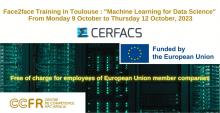Abstract
This training course enables the participants to reinforce their theoretical and practical knowledge in order to implement machine learning techniques for the automatic analysis of data. The main statistical methods for data analysis are presented, both for data exploration (non-supervised learning) and for prediction (supervised learning). Each method is first presented and commented on a theoretical level, and then illustrated on numerical experiments run with public datasets using R and/or python/scikit-learn software.
Objective of the training
To know the main algorithms of automatic data analysis, and to know how to use them with R and/or python/scikit-learn.
Learning outcomes
The participants should be able to :
- recognize the type of problem that they are facing (supervised or non-supervised learning, sequential learning, reinforcement learning…);
- choose the right algorithm to use;
- use an R on python implementation of this algorithm.
Teaching methods
The training is an alternation of theoretical presentations and practical work. A multiple choice question allows the final evaluation. The training room is equipped with computers, the work can be done in sub-groups of two people.
Referent teacher: Béatrice LAURENT BONNEAU
Target participants
This training session is for students, engineers, and computer scientists who wish to reinforce or extend their theoretical background and practical knowledge on automatic data analysis by statistical learning algorithms.
Prerequisites
- Be an employee of a European company; a certificate from the employer is required.
- Have at least 5 years of higher education.
- Basic knowledge in statistics: elementary probability, statiscal tests, Gaussian linear model.
- Basic knowledge in algorithmic and programming.
- Install Python 2.7 with Anaconda, R 3.4.2 and IRkernel. Internet access during the sessions in order to get possible updates or to load additional libraries.
- The training can take place in French or English depending on the audience, level B2 o f CEFR is required.
In order to verify that the prerequisites are satisfied, the following questionnaire must be completed. You need to get at least 75% of correct answers in order to be authorized to follow this training session. If you don’t succeed it, your subscription will not be validated. You only have to chances to complete it.
Questionnaire 1 https://goo.gl/forms/xL86TzPDFOC5r7ln1
Registration
After completing the pre-requisite tests and obtaining at least 75% correct answers, you can register: here
Deadline for registration: 15 days before the starting date of each training
Before signing up, you may wish to report us any particular constraints (schedules, health, unavailability…) at the following e-mail address : training@cerfacs.fr
Fee
This training course, financed as part of the European EuroCC2 project, is free of charge and reserved for employees of European Union member companies.
It normally costs €2,520 excluding VAT.
However, your registration is subject to the payment of a deposit of 200 Euros. This sum will be returned to you at the end of the course if your participation has been effective. If not, it will be retained as compensation for the prejudice caused by leaving people unnecessarily on the waiting list.
Program
From 9h30 to 13h00, and from 14h00 to 17h15
Morning: lecture; afternoon: hands-on sessions.
Day 1
General presentation of statistical machine learning and its main approachs. Comparison with traditional statistics and machine learning.
Unsupervised learning:
– Principal component analysis
– Agglomerative Hierarchical Clustering
– k-means, k-medoids and variants
– overview of other methods : Affinity Propagation, dbscan, etc.
Day 2
Supervised learning 1 / 2 :
– k nearest neighbors
– Gaussian linear model, logistic regression, model selection
– LASSO et variants
– Support Vector Machines
Day 3
Supervised learning 2 / 2 :
– Decision Trees
– Bagging, Random Forests, Boosting
– Neural networks, deep learning
Day 4
Sequential learning, multi-armed bandit problems
Super-learning and expert aggregation
Reinforcement learning (introduction)
Evaluation of learning
A final exam will be conducted during the training.
